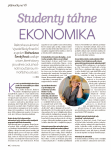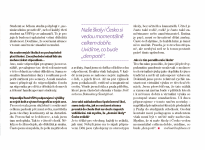An Interview with Bohuslava Šenkýřová in the Magazine MF Dnes Family
Which of the university study programmes are currently, in your opinion, the most attractive ones for young people?
It is difficult to judge. When talking about study programmes at our school, the interest slightly changes with time. It can be affected by the changing offer of state universities that are trying, at the time of reduced numbers of secondary school leavers, to admit as many students as possible, and thus they have newly accredited study programmes which used to be a domain of private universities.
You are not a purely economic university, even though most of your study programmes focus on economy.
We also have accredited security and law study programmes. It shows that our „younger“ programmes – Law in Business, Criminalistics and Forensic Disciplines, and Security and Legal Studies are „cool“ not only for young people. People realize that with the world changing, security is becoming one of the most resonating topics in present days as well as in future. We also have to mention Applied Informatics, in which people have been permanently interested in a long term. We are one of a few private universities that has this programme accredited for bachelor as well as for master studies.
Criminalistics and Forensic Disciplines – that sounds a little unusual. Are girls interested in theses studies as well?
Of course, and they often belong among the most enthusiastic students. The interest in this programme is extraordinary maybe because, as far as I know, it is not accredited at any other university. Our lecturers are well renowned experts in the field. Among others, I can name its quarantor prof. Jiří Straus, an internationally respected forensic biochemist and investigator. Currently, we are trying to have this programme accredited even for the master studies.
The University of Finance and Administration was the first private university in the Czech Republic to obtain the status of a university. How difficult is it to get a status in the Czech Republic?
It was not easy and in the near future it may be even harder. You do not obtain the status of a university "for life", as it has turned out also with new accreditations. So far, of the three private universities, only two have newly defended the accreditation of doctoral study programmes, which is a condition for getting the status of a university. We are proud to be one of them, and we have even accredited the doctoral study programme in English, in addition to Czech.
The university is not only based on high quality teaching, it mainly needs to show high quality research.
That's right, you need to have competent academics in your team who can develop research projects that can compete with public universities. We also have joint projects. And sure, it is also about good quality publishing activities. It is not easy to finance these activities only from your own resources. Thus we are glad that, thanks to our excellent results, we managed to obtain not only institutional funding, but also ring-fenced funding for the specific university research.
In addition to doctoral studies, you also offer MBA studies. In your opinion, which university degrees are the most valuable ones for potential employers?
We have been implementing MBA programmes in cooperation with the City University of Seattle since 2002. The on-going interest in this programme proves it is of a good quality, even though an MBA degree had not been "recognized" in our country for a long time. I may be a little naive thinking that a degree shouldn't play the main role. It is knowledge and skills that are essential, and as for universities, how well their graduates find employment. You will find our students in important positions in many areas, from banking, through business, marketing, to public administration. Employers give more significance to what graduates can do, rather than to what degree they have. And I am convinced that our graduates have a good reputation and perhaps, a degree from VŠFS is a guarantee for HR professionals.
In what positions, in particular, do your graduates "end up"?
You can find them really everywhere. These include, for example, the director of the city police of a larger town, a well-known television presenter, the director of a large insurance company, a number of top athletes, there may not be a single financial institution in our country where you would not find our graduate. And many of them are successfully developing their own business.
Do they also leave for foreign countries?
The study at VŠFS often includes a study stay at a foreign university. During their studies, students are in the "international environment", as every third student at VŠFS is from abroad. This is very important experience for their future employment. We hope that the current situation will not fundamentally change anything in this respect.
In private schools, students have to pay, of course, tuition fees. However, disadvantaged young people can get a scholarship ...
Yes, our scholarship programmes are extensive, we consider the so-called third role of universities in this area to be very important. I myself try to support homes for the elderly with financial donations and masks. And our employees contribute to the scholarship fund for children from children's homes and for physically handicapped students.
You also support the VŠFS Scholarship Fund with the proceeds from your books and photo exhibitions from your travels.
I have travelled fifty-five countries around the world in total for business and privately, I have visited all the continents except for Antarctica. The icebreaker broke down, so I didn't get there. That's life. Sometimes you don’t attain the goal but your effort is what matters. I often thought I was going to see the countryside and animals. Maybe I wanted to get some rest from people. However, the reality was different. In the end, in every country, I was most interested in people and their life. With few exceptions, I met nice, forthcoming and inspiring people. I took photos and wrote stories everywhere. I partially summarized those in my book The World through the Heart of Bohuslava Šenkýřová.
You are also the founder of the Association of Schools, so you know how the current situation affects functioning of schools at all levels of education. How well, do you think, the Czech Republic manages "home schools"?
It's hard for everyone. Everyone is doing their best. We were not prepared for that. Children feel adrift from the school stereotype, from being without teachers and friends. It is often a parent who is a teacher and who is often an employee or employer at the same time. The routine is gone, changes must be made creatively. We often hear now that every crisis is a chance for changing things. True, it is a hackneyed phrase a little bit, however we have no other choice but tackling it this way.
How did your school handle this?
It helped us a bit that we, already before the outbreak of the pandemic, considered the possibilities of virtual teaching as a supplement to traditional teaching. So we had already purchased the equipment. Thus, we were able to start virtual teaching in three classrooms relatively quickly. I am convinced that this sudden and forced change will be useful for other things in the coming years, and that the virtual teaching will gradually become a standard. We have already been preparing some innovations in this respect - for example, transmitting some lectures from Prague to our study centers. However, a personal contact between a teacher and a student must be to a certain extent maintained. I think that our schools and the schools of the Czech Republic are doing quite well at the moment, we will see what will happen "the day after".














